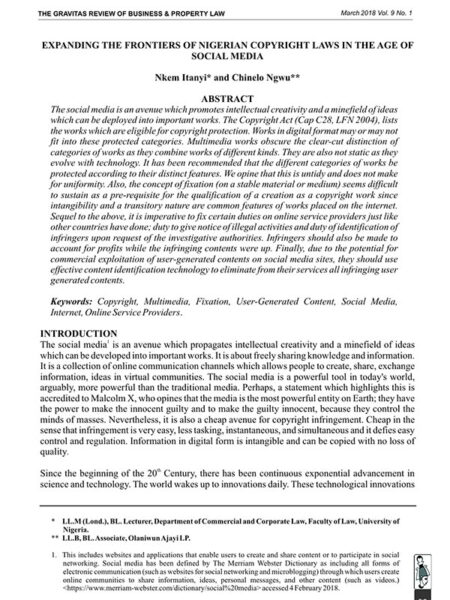-
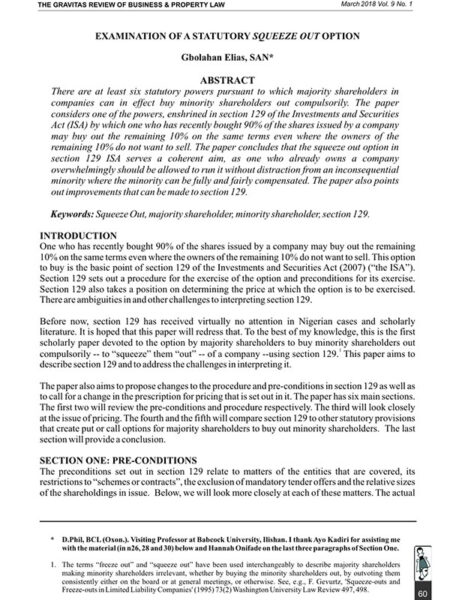
Examination of a Statutory Squeeze Out Option
0₦2,500.00Professor Gbolahan Elias, Chairman, Lagos State Law Reform Commission, and Partner G. Elias & Co in his article, “Examination of a Statutory Squeeze Out Option”, notes that there are at least six statutory powers pursuant to which majority shareholders in companies can in effect buy minority shareholders out compulsorily. He considers one of the powers enshrined in section 129 of the Investments and Securities Act (ISA) by which one who has recently bought 90% of the shares issued by a company may buy out the remaining 10% on the same terms even where the owners of the remaining 10% do not want to sell. He concludes that the squeeze out option in section 12 ISA is, as one who already owns a company overwhelmingly should be allowed to run it without distraction from an inconsequential minority where the minority can be fully and fairly compensated.
-
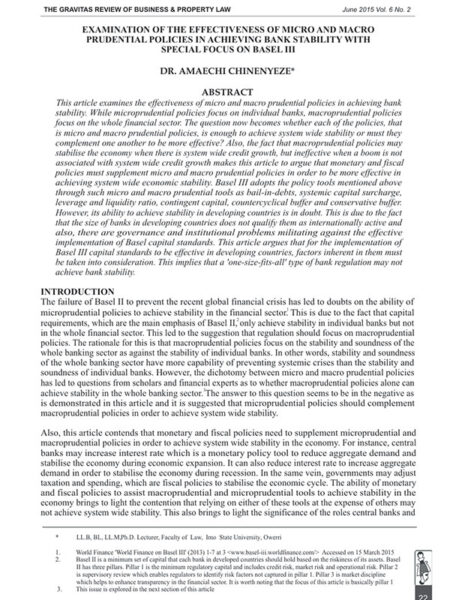
Examination of the Effectiveness of Micro and Macro Prudential Policies in Achieving Bank Stability with Special Focus on Basel III
0₦2,500.00Dr. Amaechi Chinenyeze of the Imo State University pushes the theme in Professor Ajayi’s paper further by arguing that micro prudential policies which aim at stabilising individual banks may not be enough and that monetary and fiscal policies must supplement micro and macro prudential policies in order to be effective in achieving system wide economic stability. His article, “Examination of the Effectiveness of Micro and Macro Prudential Policies in Achieving Bank Stability with Special Focus On Basel III”, is an essential read for banking regulators.
-
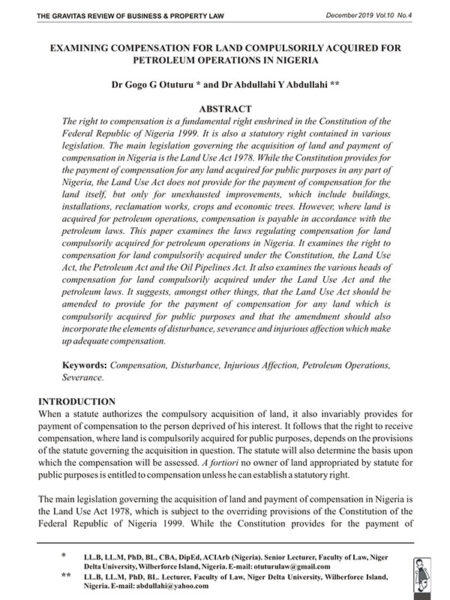
Examining Compensation for Land Compulsorily Acquired for Petroleum Operations in Nigeria
0₦2,500.00Dr Gogo Otuturu and Dr Abdullahi Abdullahi of the Faculty of Law, Niger Delta University, Wilberforce Island Nigeria in their article, note that the right to compensation for land compulsorily acquired is both a constitutional and statutory right. While the Constitution provides for the payment of compensation for any land acquired for public purposes, the Land Use Act provides for compensation, not for the land itself, but for unexhausted improvements. Where the land is acquired for petroleum operations, compensation is payable in accordance with the Petroleum Act and the Oil Pipelines Act. Otuturu and Abdullahi examine the various heads of compensation for land compulsorily acquired under the Land Use Act and the petroleum . They suggest an amendment of the laws to incorporate the elements of disturbance, severance and injurious affection.
-
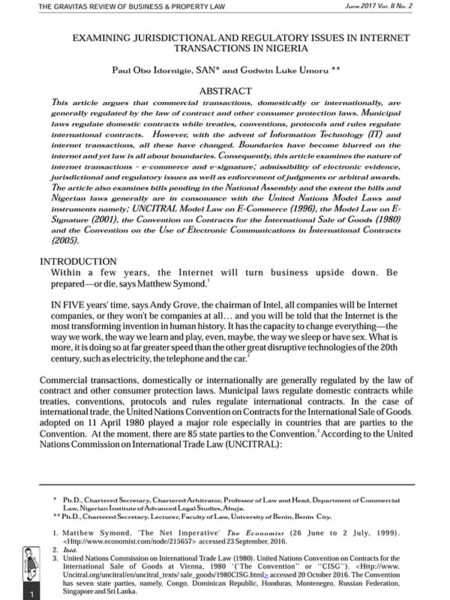
Examining Jurisdictional and Regulatory Issues in Internet Transactions in Nigeria
0₦2,500.00Professor Paul Idornigie SANof the Nigerian Institute of Advanced Legal Studies and Dr Godwin Umoru of the University of Benin in their article “Examining Jurisdictional and Regulatory Issues in Internet Transactions in Nigeria”, examine the extra-territorial nature of internet transactions and the challenges of applicable law, admissibility of electronic transmissions in evidence, enforceability of judgments, and how internet transactions are regulated. The article examines bills pending before the 8th National Assembly and the extent the bills and Nigerian laws generally conform to international conventions and protocols including the UNCITRAL Model Law on e-Commerce, the Model Law on E-Signature, the Convention on Contracts for the International Sale of Goods and the Convention on the Use of Electronic Communications in International Contracts.
-
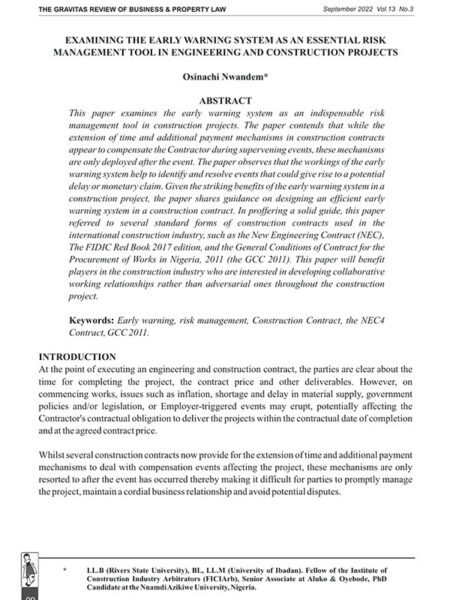
Examining the Early Warning System as an Essential Risk Management Tool in Engineering and Construction Projects
0₦2,500.00Osinachi Nwandem, Senior Associate Aluko & Oyebode and Fellow of the Institute of Construction Industry Arbitrators, in his article, Examining the Early Warning System as an Essential Risk Management Tool in Engineering and Construction Projects, considers the early warning system as an indispensable risk management tool in construction projects. He contends that while the extension of time and additional payment mechanisms in construction contracts appear to compensate the Contractor during supervening events, these mechanisms are only deployed after the event. Nwandem observes that the workings of the early warning system help to identify and resolve events that could give rise to a potential delay or monetary claim. Given the striking benefits of the early warning system in a construction project, he shares guidance on designing an efficient early warning system in a construction contract.
-
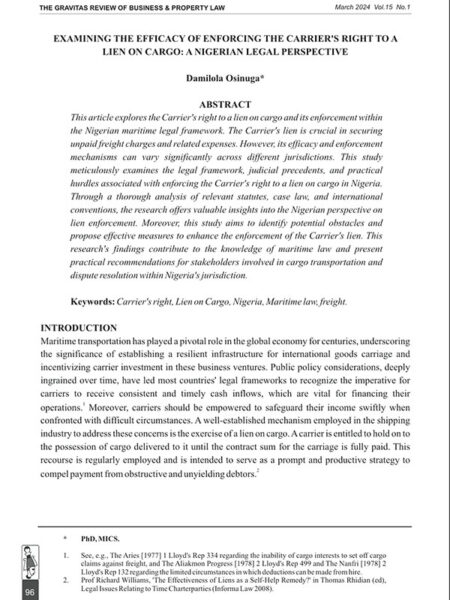
Examining the Efficacy of Enforcing the Carrier’s Right to a Lien on Cargo: A Nigerian Legal Perspective
0₦2,500.00Dr. Damilola Osinuga, in his article, Examining the Efficacy of Enforcing the Carrier’s Right to a Lien on Cargo: A Nigerian Legal Perspective, provides an in-depth exploration of the carrier’s right to a lien on cargo and its enforcement within the Nigerian maritime legal framework. The carrier’s lien plays a crucial role in securing unpaid freight charges and related expenses. However, its efficacy and enforcement mechanisms can vary significantly across different jurisdictions. Osinuga meticulously examines the legal framework, judicial precedents, and practical hurdles associated with enforcing the carrier’s right to a lien on cargo in Nigeria. Through a thorough analysis of relevant statutes, case law, and international conventions, the research offers valuable insights into the Nigerian perspective on lien enforcement. Osinuga aims to identify potential obstacles and propose effective measures to enhance the enforcement of the carrier’s lien.
-
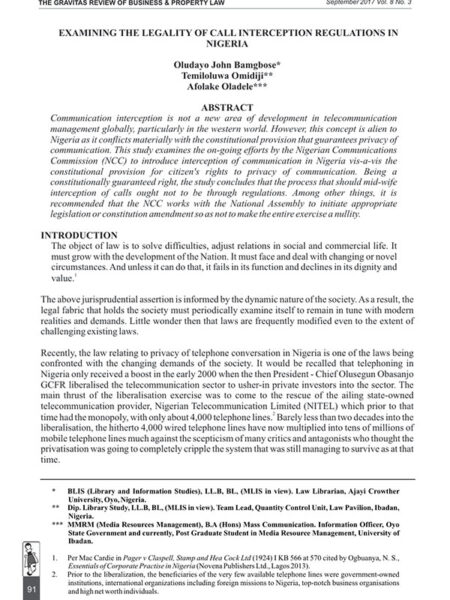
Examining the Legality of Call Interception Regulations in Nigeria
0₦2,500.00Oludayo Bamgbose (Law Librarian, Ajayi Crowther University), Temiloluwa Omidiji (Quantity Control Unit, Law Pavilion) and Afolake Oladele (Information Officer, Oyo State Government) in their article, “Examining the Legality of Call Interception Regulations in Nigeria” appraise the on-going efforts by the Nigerian Communications Commission (NCC) to introduce Regulations for interception of communication in the country. Bamgbose et al argue that while lawful interception of communication is commonplace even in advanced democracies to prevent, and aid investigation of crimes including terrorism, the current efforts by the NCC will have to contend with the constitutional provision protecting telephone conversations and telegraphic communications. In the end, the NCC may be unable to achieve its objectives with a Regulation, without an amendment of the constitution, or enactment of a law that is reasonably justifiable in a democratic society.
-
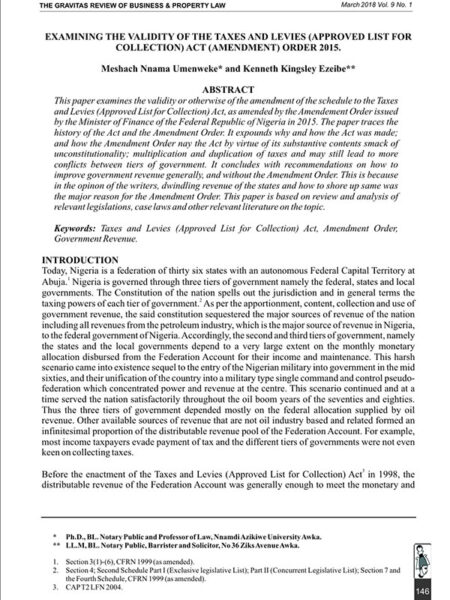
Examining the Validity of the Taxes and Levies (Approved List For Collection) Act (Amendment) Order 2015
0₦2,500.00Professor Meshach Umenweke of the Nnamdi Azikiwe University Awka, and Kenneth Ezeibe, legal practitioner, in their article “Examining the Validity of the Taxes and Levies (Approved List For Collection) Act (Amendment) Order 2015”, consider whether the Minister of Finance has the vires to amend the Schedule to the principal Act, and whether the items listed in the Order are consistent with the legislative and taxing powers of each tier of government under the Constitution.
-
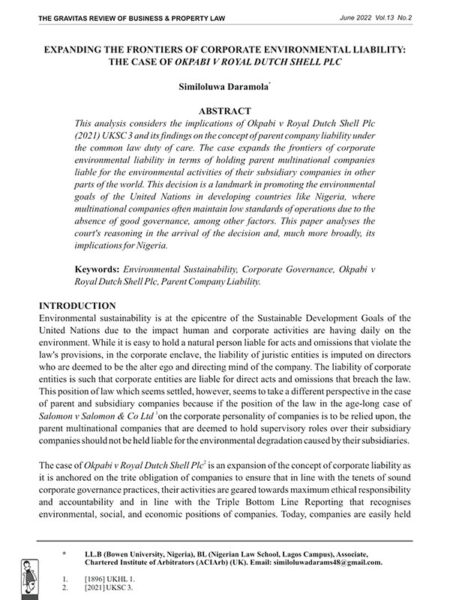
Expanding the Frontiers of Corporate Environmental Liability: The Case of Okpabi v Royal Dutch Shell Plc
0₦2,500.00Similoluwa Daramola, in her paper, Expanding the Frontiers of Corporate Environmental Liability: The Case of Okpabi v Royal Dutch Shell Plc, which reviews the English case, considers the implications of the case and the court’s decision on the concept of the parent company liability under the common law duty of care. The case expands the frontiers of corporate environmental liability in terms of holding parent multinational companies liable for the environmental activities of their subsidiary companies in other parts of the world. Similoluwa argues that the decision is vital in promoting the environmental goals of the United Nations in developing countries like Nigeria, where multinational companies often maintain lower standards of operations.
-
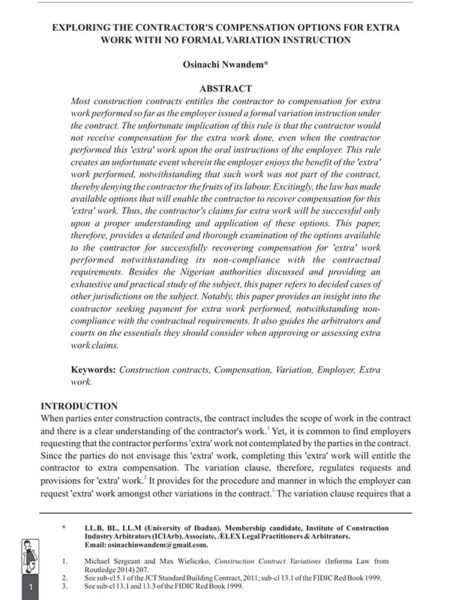
Exploring the Contractor’s Compensation Options for Extra Work with no Formal Variation Instruction
0₦2,500.00Osinachi Nwandem, an Associate at ǼLEX, in his article, Exploring the Contractor’s Compensation Options for Extra Work with no Formal Variation Instruction, notes that most construction contracts entitle the contractor to compensation for extra work performed so far as the employer issued a formal variation instruction under the contract. The unfortunate implication is that the contractor may not receive compensation for additional works done, if the contractor performed the extra work upon the oral instructions of the employer. Osinachi reviews Nigerian and foreign authorities on the issue of extra work done when there was no formal variation instruction and proffers the options available to a contractor to successfully recover compensation in such instances.
-
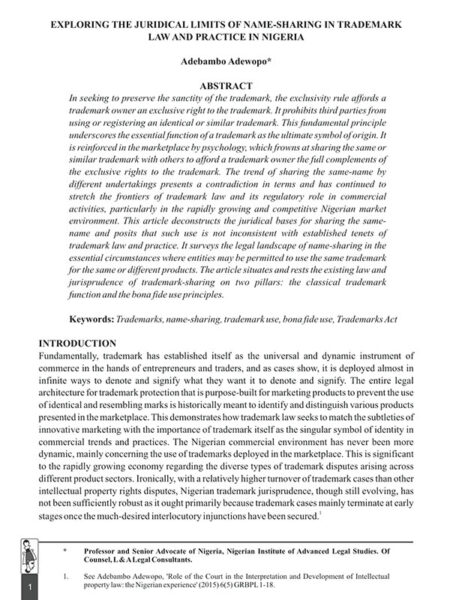
Exploring the Juridical Limits of Name Sharing in Trade Mark Law & Practice
0₦2,500.00Professor Adebambo Adewopo,in his article, Exploring the Juridical Limits of Name Sharing in Trade Mark Law & Practice explores the trend of sharing the same name by different undertakings in the rapidly growing and competitive Nigerian market environment. Prof Adewopo deconstructs the juridical bases for sharing the same name and posits that such use is not inconsistent with established tenets of trademark law and practice. Adewopo surveys the legal landscape of name-sharing in the key circumstances where entities may be permitted to use the same trademark in respect of the same or different products. The article situates and rests the existing law and jurisprudence of trademark-sharing on two pillars, namely the classical trademark function and the bona fide use principles.
The Gravitas Review of Business & Property Law

